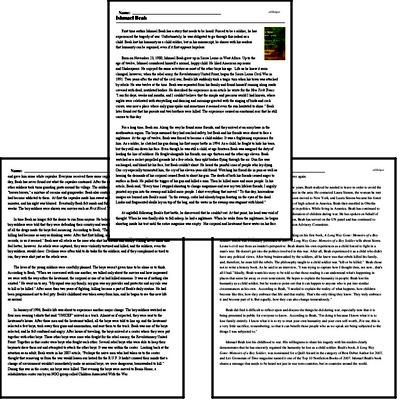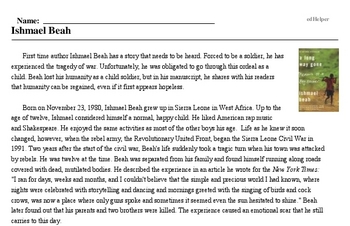Ishmael Beah
First time author Ishmael Beah has a story that needs to be heard. Forced to be a soldier, he has experienced the tragedy of war. Unfortunately, he was obligated to go through this ordeal as a child. Beah lost his humanity as a child soldier, but in his manuscript, he shares with his readers that humanity can be regained, even if it first appears hopeless.
Born on November 23, 1980, Ishmael Beah grew up in Sierra Leone in West Africa. Up to the age of twelve, Ishmael considered himself a normal, happy child. He liked American rap music and Shakespeare. He enjoyed the same activities as most of the other boys his age. Life as he knew it soon changed, however, when the rebel army, the Revolutionary United Front, began the Sierra Leone Civil War in 1991. Two years after the start of the civil war, Beah's life suddenly took a tragic turn when his town was attacked by rebels. He was twelve at the time. Beah was separated from his family and found himself running along roads covered with dead, mutilated bodies. He described the experience in an article he wrote for the New York Times: "I ran for days, weeks and months, and I couldn't believe that the simple and precious world I had known, where nights were celebrated with storytelling and dancing and mornings greeted with the singing of birds and cock crows, was now a place where only guns spoke and sometimes it seemed even the sun hesitated to shine." Beah later found out that his parents and two brothers were killed. The experience caused an emotional scar that he still carries to this day.
For a long time, Beah ran. Along the way he found some friends, and they arrived at an army base in the southeastern region. The boys assumed they had reached safety, but Beah and his friends were about to face a nightmare. At the age of twelve, Beah was forced to become a child soldier. It was a frightening experience for him. As a solder, he clutched his gun during his first major battle in 1994. As a child, he fought to hide his tears, but they still ran down his face. Even though he was still a child, at age fourteen Beah was assigned the duty of leading the line of soldiers. He fought alongside his friends, one age thirteen and the other age eleven. Beah watched as a rocket-propelled grenade hit a few rebels, their split bodies flying through the air. Gun fire was exchanged, and blood hit his face, but Beah couldn't shoot. He heard the painful cries of people who lay dying. One cry especially tormented him, the cry of his eleven-year-old friend. Watching his friend die in pain as well as hearing the demands of his corporal caused Beah to shoot his gun. The death of both his friends caused anger to surface in Beah. He pulled the trigger of his gun and killed a man. Then he killed more and more people. In his article, Beah said, "Every time I stopped shooting to change magazines and saw my two lifeless friends, I angrily pointed my gun into the swamp and killed more people. I shot everything that moved." To this day, horrendous images are burned into Beah's mind. "In the swamp, crabs had already begun feasting on the eyes of the dead. Limbs and fragmented skulls lay on top of the bog, and the water in the swamp was stagnant with blood."
At nightfall following Beah's first battle, he discovered that he couldn't eat. At that point, his head was void of thought. When he was finally able to fall asleep, he had a nightmare. When he woke from the nightmare, he began shooting inside his tent until the entire magazine was empty. His corporal and lieutenant threw water on his face and gave him some white capsules. Everyone received these same capsules before going into battle. Even to this day, Beah has never found out what the capsules contained. After the completion of the first battle, he and the other soldiers took turns guarding posts around the village. The soldiers were given marijuana, and they sniffed "brown brown," a mixture of cocaine and gunpowder. Beah also continued taking the white capsules because he had become addicted to them. At first the capsules made him sweat and shake. He also lost his hearing for a few minutes, and his sight was blurred. Eventually Beah felt numb and full of energy. Sleep was not possible for weeks. The boy soldiers were shown war movies such as First Blood. They all wanted to be like Rambo.
In time Beah no longer felt the desire to run from anyone. He believed himself to be a part of something. The boy soldiers were told that they were defending their country and were honorable for doing so. The combination of all the drugs made the boys feel menacing. According to Beah, "The idea of death didn't cross my mind, and killing had become as easy as drinking water. After that first killing, my mind had stopped making remorseful records, or so it seemed." Beah saw all rebels as the ones who shot his friends and family. Killing never made him feel better, however. As rebels were captured, they were violently tortured and killed, and the soldiers, even the boy soldiers, would cheer. Civilians were often told to do tasks for the soldiers, and if they complained or tried to run, they were shot just as the rebels were.
The lives of the young soldiers were carefully planned. The boys weren't given time to be alone or to think. According to Beah, "When we conversed with one another, we talked only about the movies and how impressed we were with the way either the lieutenant, the corporal or one of us had killed someone. It was as if nothing else existed." He went on to say, "My squad was my family, my gun was my provider and protector and my rule was to kill or be killed." After more than two years of fighting, killing became a part of Beah's daily routine. He had been programmed not to feel pity. Beah's childhood was taken away from him, and he began to see this new life as normal.
In January of 1996, Beah's life was about to experience another major change. The boy soldiers watched as four men wearing t-shirts that said "UNICEF" arrived in a truck. Almost as if expected, they were sent to the lieutenant's house. After these men and the lieutenant talked, all the boys were told to line up, and the lieutenant selected a few boys, took away their guns and ammunition, and sent them to the truck. Beah was one of the boys selected, and he felt confused and angry. After hours of traveling, the boys arrived at a center where they were put together with other boys. These other boys were ones who fought for the rebel enemy, the Revolutionary United Front. Together in this center were boys who fought each other. Several rebel boys who were able to keep their bayonets drew them out and attempted to attack the other boys. It was war within the center. Looking back at the situation as an adult, Beah wrote in his 2007 article, "Perhaps the naïve men who had taken us to the center thought that removing us from the war would lessen our hatred for the R.U.F. It hadn't crossed their minds that a change of environment wouldn't immediately make us normal boys; we were dangerous, brainwashed to kill." During this war in the center, six boys were killed. That evening the boys were moved to Benin Home, a rehabilitation center run by an NGO group called Children Associated With the War.
Beah found himself being told what to do by civilian men. All the boys found this difficult, and they fought the medical checkups and one-on-one counseling sessions. The drugs given to them by the soldiers were beginning to wear off the boys, and they struggled with cravings. One evening several of the boys even broke into the mini-hospital set up in the home in an attempt to drug themselves. The boys were violent and fought every attempt made to change the harsh brainwashing that had been done to them. Eventually, after a few months, some of the boys started getting through the withdrawal stage, and the violence began to lessen. Once they had time to think about their experiences during war, the boys turned to violence again in order to avoid the difficult images. Beah eventually relearned how to sleep without medicine, but it took several months to do this. His nightmares continued, however. He couldn't reach the memories of his life before the war.
Beah eventually shared the truth about his experiences to Ester, a nurse at the mini-hospital, when she questioned the multiple wounds on his legs, bullet wounds he received during an enemy ambush. According to Beah, "I told her the whole story not because I really wanted to but because I thought that if I told her some of the truth of my war years, she would be afraid of me and would cease asking questions." Beah was told by the nurse as well as the other staff members that what happened wasn't his fault. He was only a child. Eventually most of the boys at the center found someone they could trust.




